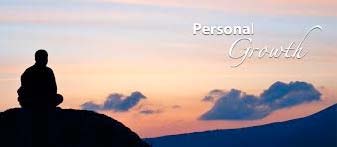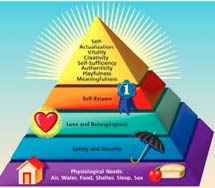A Coaching Power Tool created by Hanan Ibrahim
(Youth and Parenting Coaching, UNITED STATES)
Case Study
Amal is a single mother of two, she is the sole provider of her household. Amal has been an elementary schoolteacher for fifteen years and is able to provide for her family, financially, based on her income. As a secondary income she is able to gain a little more income with after school programs. However, the question is whether shewants to be an elementary school teacher for the rest ofher life. Is this her destiny? Is this her dream? As anelementary school teacher the job is not a challenge for her, does not fulfill her potential. She adores the kids, but,the environment or job does not fulfill her need or ambition.Therefore, she became depressed and unmotivated.
For the past 5 years she has been entertaining ideas of leaving the school and exploring other options: after all shehas a B.A. in Education and Masters in Business Administration, great communication skills which she developed throughteaching. However, with the current economic problems, she’s afraid she won’t find work outside of teaching.
Feeling imprisoned by her survival needs, Amal has started to feel hopeless, angry and resentful. Unable to find a way out, she has programmed her mind to accept the situation and submit to the reality of being lucky to have a good joband able to survive this economic recession.
A year ago while attending a teacher’s workshop, she was introduced to the coaching profession: she loved it andsigned up for the program. She has worked hard trying to finish the requirements and graduate on time. With her experience as a teacher and her communication skills she has found her passion. She has sharpened her coaching skills in her dealings with students, parents, coworkers, and continuously gets great positive response and feels great.
She comes to the coaching relationship with the following dilemma: Isn’t time to start my own coaching business,and leave the job that dragged me down for the past 15 years? Every business needs time and patience to grow, what ifI can’t make it out there? Is it going to generate enough money to pay my bills and live comfortably, and support my children? I already have some clients and everyone has assured me that I’ll be extremely successful. The time is now tomove on, but can I risk a secure income, can I risk stability and comfort? I must be selfish for risking my children’s futurethat way.
All these thoughts of insecurities and fear plague Amal’s mind every day. She is battling between the needs for economic survival and personal growth.
Now let’s ask ourselves:
What needs are Amal trying to meet? What is her underlying belief? Is it working for her or against her? What arethe true barriers which are preventing her from following her passion? How does a coach work with a very fixed survivalmode? How can a coach create a shift in perspective, allowing growth while acknowledging survival needs?
Self-Application
According to human psychology Abraham Maslow (1908-1970), human behavior is guided and directed by basic requirements for survival and growth. These requirements are arranged according to their power to motivate theindividual.
According to Maslow, lower needs must bereasonably satisfied in order for the person to focus on higher need.Hestated that complete satisfaction may not benecessary, he indicated that most people wouldshow range of need satisfaction at anytime, for example a person might be 85% satisfied in thearea of physiological and safety needs, 60% in theneed of love and connection.
Dr Denise L Schmitt(Ph.D), stated that human beings are influenced by a wide range of Needs and Motives, for someLove , Safety and Security paramount Values , while others are motivated by desires for Power and Dominance, also notnecessarely the ones who satistfy their lower needs reach for a higher one, as the behaviour of many wealthy individuals indicate( American Phychological Association) .
Survival
One of our key design principles is that we’re built to be triggered into survival mode whenever our survival is threatened,not only physiologically but also emotionally, anytime we feel pain or stress or uncertainty we’re thrown intosurvival mode.
In the fast pace of our modern world we live in today, in the midst of the world economic hardship, senseless wars,life threatening diseases, uncertainty and social isolation, survival needs became a priority and a must to be able towithstand the physiological and emotional stress. For the majority of us, we are switched to an auto pilot survival modethat seem indefinite, and it became the source of our identity and significance as human being, to the level that in many underdeveloped countries there is a say: “You are worth what you earn” meaning that if you have money you are valued, ifnot, you worth nothing.
Unfortunately that way of thinking is spreading in our world community like wild fire leaving no room for Dreams,Passion, Aspirations or Adventures which is imperative for our personal growth, leaving no time to reflect, explore or todiscover our true self, our potential or who are we meant to be. In a survival mode we become afraid of challenges or taking risk and we guard our comfort with our life.
It reminds of a scene of a movie where a student was trying to open a university based only on one’s passions,with no rigid, set curriculum and to become accredited as a school, asked a panel to make this school a reality strictly based on a person’s passions. His question that changed the minds of the panel was, “What did you want to be as a kidwhen you grow up?” Almost all the people on the panel ended up saying something completely different than their currentcareers such as “I wanted to be a pilot or a musician.”
Growth
There is only one corner of the universe you can be certain of improving, and that’s your own self.
Aldous Leonard Huxley
By definition Growth means;
The process of developing or maturing physically, mentally or spiritually.Human development is a lifelong process of behavioral cognitive and emotional growth and change. Throughout the process each person develops attitudes and values that guide choices, relationships and understanding.
THE OVERBEARING KING
Let’s consider this analogy; I loved it when I read it;
“Imagine a kingdom that is ruled by an overbearing king who requires absolute servitude. Imagine this King sitting down to his dinner table in his castle. He kept all his cabinets and servants running about to bring him dinner, and require they serve him fully, disregarding everyone else’s in the kingdom, evendisregarding his own cabinet’s needs until he is completely sated. His foreign minister who is expected at an importantaffair at a neighboring Kingdom, find himself pouring ale. His minister of domestic affairs rather that addressing the issueof failing economy, slices roast turkey. His staff grabs food for themselves here and there but never get what they really need or want, and consequently are unsatisfied, malnourished and under developed. The king’s immediate needs arebeing met and he is tolerably happy, but he is an ineffective King.
He has no concept of Success beyond his daily needs. Since he cannot see beyond his own needs the entireKingdom suffers” (BSM consulting.Inc)
Likewise when one need is dominant above all other considerations, often result in a person who is unsatisfied and unbalanced.
BARRIERS FOR PERSONAL GROWTH
A famous teacher of Sidda Yoga once said: “The biggest barrier we have is our wrong way of thinking”
What is holding you back and getting in the way of following your passion?
- Fear: Probably the biggest barrier to personal growth and self-development that any of us can face is fear. Some ofus fear failure, other fear success. We may fear making wrong decisions or fear change. However if we allowourselves to acknowledge that fear, than face it, often we have a great sense of liberation. Bring any fear out to thelight and its power lessens dramatically.
- Lack of support: Lack of support is a major barrier to personal growth, involving close member of our family,sharing dreams with a friend can help us find that support, if we find resistance for any reason it’s important tosurround ourselves with people who have the same goal in mind.
- Limiting belief: Our own limiting belief and self-doubt can be a huge barrier to growth, trusting ourselves requires courage and a certain amount of faith.
- Guilt Barriers: Guilt has many faces that can be a barrier to personal growth, we usually feel guilty, when we dosomething we believe is wrong, and not able to forgive ourselves for it, others feel guilty when they go after their dreams and passion, especially if there would be sacrifices made and family would be involved.
- Perfectionism Barrier: The idea of not being good enough or perfect enough is part of a vicious cycle ofprocrastination. Professionals say that Perfectionism is an unwillingness to succeed as much as it is anunwillingness to fail. Sometimes all we need to take is just the first step.

